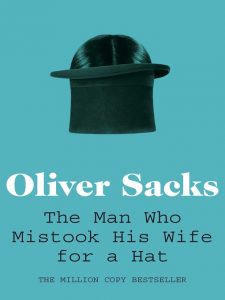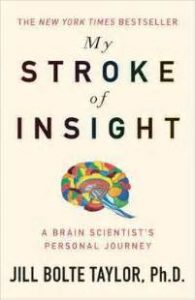Have you noticed how literal and wordy we are, and how little we notice body language? People with aphasia are the opposite.
I have been reading memoirs about and by people with aphasia and language problems, and aphasics all seem to become more alive to body language and the meaning that lies behind facial expressions. John Hale was already an excellent actor and mimic before stroke abolished his language, but his wife Sheila observed how much more sensitive he became to gesture and tone of voice. ‘Those with reduced comprehension of language are able to understand the gist of what … Read more...
Tag: aphasia
Oliver Sacks – The Man Who Mistook His Wife For A Hat
 Oliver Sacks differentiates his vignettes from conventional medical case histories by their engagement with ‘the person, and the experience of the person, as he faces, and struggles to survive, his disease’. This collection of portraits is therefore included in these ‘illness narratives’ for their insights into the personal experience of different conditions. It is for the reader to judge how well Sacks fulfils his undertaking to engage with the individual and enter his experience. When I read these today, I am very aware of Sacks the neurologist, determined to classify exactly, using exactly the correct medical terminology. But perhaps his … Read more...
Oliver Sacks differentiates his vignettes from conventional medical case histories by their engagement with ‘the person, and the experience of the person, as he faces, and struggles to survive, his disease’. This collection of portraits is therefore included in these ‘illness narratives’ for their insights into the personal experience of different conditions. It is for the reader to judge how well Sacks fulfils his undertaking to engage with the individual and enter his experience. When I read these today, I am very aware of Sacks the neurologist, determined to classify exactly, using exactly the correct medical terminology. But perhaps his … Read more...
Douglas Ritchie – Stroke: A Diary of Recovery
Although this account was written over 50 years ago, and includes some items that are culturally removed from today’s clinicians (like London buses with open platforms), Douglas Ritchie’s book about his stroke and aphasia still has much to offer. He had a stroke in May 1955, starting a diary in 1956, and beginning to write for this book in March 1957. The book’s first edition ended with a chapter summarising the progress seen at 4 years, but the second edition has an additional chapter, ‘Ten Years After’ written in May 1965.
The original stroke left Ritchie with a right-sided paralysis, … Read more...
Guy Wint – The Third Killer: Meditations on a Stroke
Although somewhat of a period piece Guy Wint’s Meditations on a Stroke are well worth a read. This collection of musings are beautifully written, as befits the journalist author, but perhaps surprising in one who had severe aphasia following his CVA. They were written some time after the events they describe, like so many memoirs, but there is an air of truth, for example in Wint’s description of his weariness and aversion to effort in the stroke’s aftermath. Not all of this book will be relevant to some readers and can be omitted: the chapter on Indian diplomat K.M.Pannikar, and … Read more...
Sheila Hale – The Man Who Lost His Language
 Authentic first person accounts of strokes that destroy access to language are very rare. Jill Bolte Taylor‘s memoir gives a retrospective impression of what it was like to exit and re-enter non-verbal and verbal worlds, although there is an element of reconstruction in this later version of the first hours after her bleed. The Man Who Lost His Language is the next best thing to a first-hand account. It is a description and analysis of dysphasia by a partner and closest carer, who observed The Man’s stroke and subsequent rehabilitation and years after the stroke. The man in this … Read more...
Authentic first person accounts of strokes that destroy access to language are very rare. Jill Bolte Taylor‘s memoir gives a retrospective impression of what it was like to exit and re-enter non-verbal and verbal worlds, although there is an element of reconstruction in this later version of the first hours after her bleed. The Man Who Lost His Language is the next best thing to a first-hand account. It is a description and analysis of dysphasia by a partner and closest carer, who observed The Man’s stroke and subsequent rehabilitation and years after the stroke. The man in this … Read more...
Jean-Dominique Bauby – The Diving-Bell and the Butterfly
 How can we even imagine what it must be like to have Locked-In Syndrome? Unable to move anything, but still completely conscious and aware. The account by Jean-Dominique Bauby challenges us to make the effort to do exactly that.
How can we even imagine what it must be like to have Locked-In Syndrome? Unable to move anything, but still completely conscious and aware. The account by Jean-Dominique Bauby challenges us to make the effort to do exactly that.
The Diving Bell and the Butterfly comes in several formats and each have their strengths. There is the book which was a sensation when it was first published in 1997 and which has since been translated into many languages. The French feature film was released in 2007 with an amazing performance by Mathieu Amalric. It is clear from this film that … Read more...
A.R.Luria – The Man with a Shattered World
 Zasetsky is the soldier whose journals form the subjective core of this book. In 1943, aged 23, he received a bullet wound in the left temporo-parieto-occipital area of the brain, leaving him severely aphasic. During his rehabilitation and over the next 30 years, he struggled to express what was happening to him, word by word, and to describe the difficulties he faced, in 3,000 pages of journals. For 25 years he was lucky to be cared for by the great Russian psychologist, Professor AR Luria, known among other things for a textbook on Traumatic Aphasia, using the results of … Read more...
Zasetsky is the soldier whose journals form the subjective core of this book. In 1943, aged 23, he received a bullet wound in the left temporo-parieto-occipital area of the brain, leaving him severely aphasic. During his rehabilitation and over the next 30 years, he struggled to express what was happening to him, word by word, and to describe the difficulties he faced, in 3,000 pages of journals. For 25 years he was lucky to be cared for by the great Russian psychologist, Professor AR Luria, known among other things for a textbook on Traumatic Aphasia, using the results of … Read more...
Jill Bolte Taylor – My Stroke of Insight
 Jill Bolte Taylor’s account (as a book and in her TED talk) of the first few hours of her cerebral haemorrhage is one of the most vivid accounts of a partial and intermittent loss of cognitive functions that has ever been written – although, inevitably, this book was written in retrospective through the partial and selective memory of the Jill Bolte Taylor who survived her. The story of those first few hours features her realisation of what was happening to her, and her strategies about who and how to call for help when periodically losing her rational and verbal … Read more...
Jill Bolte Taylor’s account (as a book and in her TED talk) of the first few hours of her cerebral haemorrhage is one of the most vivid accounts of a partial and intermittent loss of cognitive functions that has ever been written – although, inevitably, this book was written in retrospective through the partial and selective memory of the Jill Bolte Taylor who survived her. The story of those first few hours features her realisation of what was happening to her, and her strategies about who and how to call for help when periodically losing her rational and verbal … Read more...